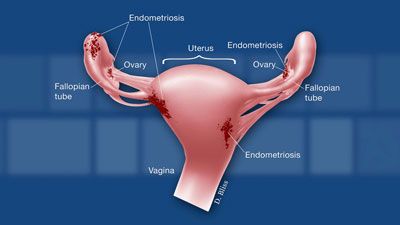
Oleuropein, a compound found in olive oil and olive leaves, may have the potential to treat endometriosis with fewer side effects than current treatments, suggests a study of mice and human tissue cultures funded by the National Institutes of Health.
The study was conducted by Yuri Park, Ph.D., and Sang Jun Han, Ph.D., of Baylor College of Medicine, and colleagues. It appears in the Journal of Biomedical Sciences. Funding was provided by NIH’s Eunice Kennedy Shriver National Institute of Child Health and Human Development (NICHD).
Background
Endometriosis is a disease in which patches of tissue similar to the lining of the uterus grow outside the uterus. Also referred to as lesions, these patches are usually found in the pelvic cavity, but also may develop on the ovaries, fallopian tubes, behind the uterus, and in rare cases, outside the pelvic cavity, such as on the lungs. Endometriosis affects an estimated 10% 
Treatment may include anti-inflammatory drugs, known as COX-2 selective inhibitors. However, these drugs may result in side effects like bleeding, perforation of the stomach and intestines, and increased risk for heart attack and stroke.
Because endometriosis is dependent on the hormone estrogen, treatment also may involve drugs that suppress estrogen levels. However, these treatments may cause adverse effects, such as bone thinning or weakening, hot flashes, memory loss, and insomnia in women of reproductive age.
Although endometrial lesions can be removed surgically, they may sometimes return. Severe cases of endometriosis may be treated with removal of the ovaries and uterus.
Estrogen affects tissues by binding to certain sites, or receptors, in cells. Estrogen binds to two kinds of receptors: estrogen receptor (ER) alpha and ER beta. Previous studies have shown that ER beta is involved in the growth of endometrial lesions.
Researchers discovered that oleuropein, found in olive leaves, inhibits the activity of ER beta but not ER alpha, preventing ER beta from moving to the cell nucleus after estrogen binds to it.
Results
Researchers created mouse models of endometriosis by implanting either mouse uterine tissue or human uterine tissue in female mice. Compared to controls, lesions had 6.6 times less volume in animals with mouse tissue implants and 6 times less volume in mice with human tissue implants.
Oleuropein-treated mice had a 100% pregnancy rate, compared to 70% in the control group.
In addition, Oleuropein treatment significantly reduced the inflammatory molecules resulting from estrogen binding to ER beta in both mouse models, compared to the control groups.
Oleuropein treatment was not toxic to the animals’ liver.
Significance
“In mice with endometriosis, oleuropein suppressed endometriosis and improved the pregnancy rate,” Dr. Han said. “We are excited by these promising findings as they support further exploration of the value of oleuropein as naturopathy for human endometriosis treatment.”
Reference
Park Y, et al. Oleuropein suppresses endometriosis progression and improves the fertility of mice with endometriosis. Journal of Biomedical Science. 2022.

 BACK TO TOP
BACK TO TOP